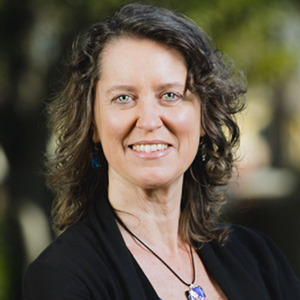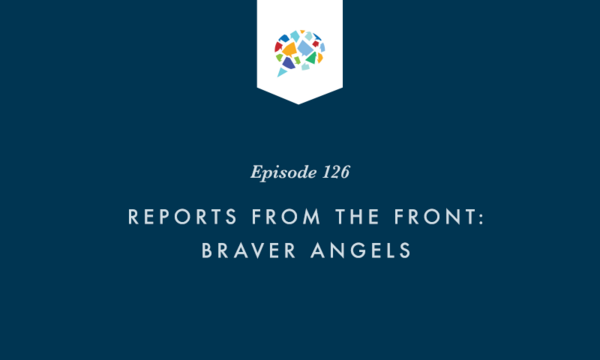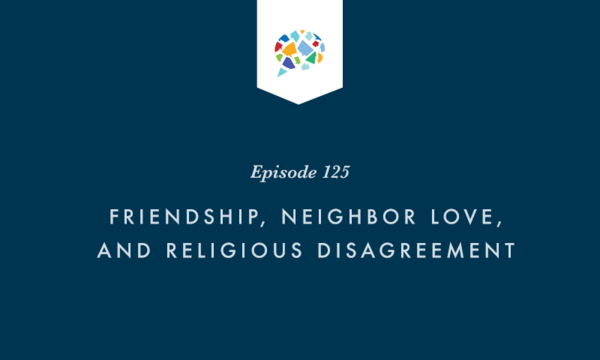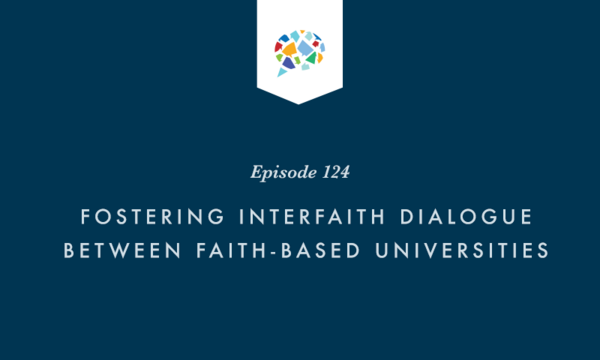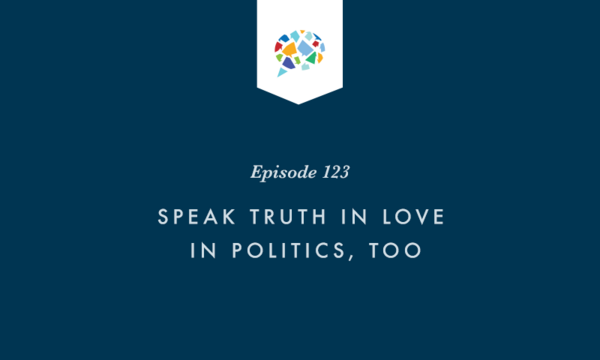On today’s episode, Tim speaks with psychologists Liz Hall (Ph.D.) and Erin Smith (Ph.D.) on how emotions shape perspectives on science, including new scientific technologies. Hall and Smith point to research that indicates emotions are some of the main features causing problems in dialogues between science and religious beliefs and values, and gaining understanding around emotions might help to address some of the uneasy tensions Christian experience between faith and controversial scientific topics. They also suggest practices to cultivate healthy and appropriate emotions when engaging in scientific technologies.
Transcript
Tim Muehlhoff: Welcome to the Winsome Conviction Podcast. My name is Tim Muehlhoff. I'm a professor of communication at ¿∂›Æ ”∆µ in La Mirada, California, and the co-director of the Winsome Conviction Project that seeks to open lines of communication rather than close those lines. And we need to find ways to talk about our fears, talk about stereotypes, talk about how to have productive conversations in a multitude of areas. And the really fun thing about being at ¿∂›Æ ”∆µ is you get to be with friends, and I'll introduce one of those in a second, and then friends that you just meet, professor from Cal Baptist. But let me introduce a concept that you're very familiar with if you've been listening to the podcast, and that is the argument culture. Deborah Tannen, Georgetown linguist, says, "One of the key traits of the argument culture is we approach everything with an adversarial frame of mind."
So I took an apologetics class. I was working on a seminary degree a while ago, and I took this great apologetics class, but I remembered, due to this topic, a note that I had written in my notes, and it had to do with scientism. And this is what the professor defines scientism: it's a philosophical view that claims science is the sole means of attaining truth about the world and reality. It asserts not only empirical, testable knowledge is valid, dismissing metaphysical, philosophical, and religious claims because they cannot be verified through the scientific method. In essence, scientism has become its own religion.
So immediately it was adversarial. I didn't know much about science, because I'm in the soft sciences. I was a theater major cum-professor. But boy, it was pretty clear that he was setting up a battle between religious conviction and science. And I think in a lot of ways, I think many of us still retain that attitude or a very weary look at science. What's fun is we're going to bring on two scholars who are going to address this perhaps adversarial relationship between science and faith. The first one's a friend, we've known each other for quite a long time, Dr. Elizabeth Hall. Welcome Liz to the program.
Liz Hall: Thank you. Great to be here.
Tim Muehlhoff: Liz is a professor in our Rosemead School of Psychology. She's an amazing scholar, amazing teacher. She's really annoying that she's good at both. I think you need to be able to pick one or the other, but she's good at both. She's published over 100 articles and book chapters, and she serves as associate editor for Psychology of Religion and Spirituality. Well, first, Liz, welcome to the podcast.
Liz Hall: Thank you, thank you.
Tim Muehlhoff: And you have a book coming out, right? With InterVarsity Press. You're in the final stages. Can you just tell us about that book?
Liz Hall: That's right. Well, it's coming out probably not for another year or so, the way that these things go, but the title is When The Journey Hurts, and it's not on this science religion topic, but it's on another area of research that I do, which is how Christians draw on their faith during hard times, during times of suffering.
Tim Muehlhoff: Oh, that's great. Well, we can't wait to... InterVarsity Press?
Liz Hall: InterVarsity Press co-authored with Jason McMartin and Kelly Kapic.
Tim Muehlhoff: Oh, that's amazing. That'd be great. We're also welcoming a brand new friend from Cal Baptist, Dr. Erin Smith is the Fletcher Jones Endowed Professor of Research. And her and Liz have been doing some fascinating research on this relationship with science. But Erin, welcome to the podcast.
Erin Smith: Thanks so much for having me.
Tim Muehlhoff: How's it feel to reach the pinnacle of your career, being on our podcast?
Erin Smith: I'm going to have the tiara shipped as soon as we're done.
Tim Muehlhoff: Beautiful. Love it. Hey, thank you so much for being here. Here's a really cool thing about something like the Winsome Conviction Project being housed in a university is that we actually get to study issues. We don't just think about it or we don't just take a stab in the dark, but we actually get to tackle different issues that we think are really relevant to our communication today. So Liz, I'm going to have you talk, just set up the research that you guys are doing and why we thought this would be a perfect marriage to bring you onto the podcast. But you are talking a little bit about our perspective of science and how it may not always be the best perspective.
Liz Hall: Yeah, I think sometimes, though, things get in the way. We look at scientific articles, something on the media, and we react to it, and that takes over our ways of thinking about it so that we end up having this, as you mentioned, kind of adversarial relationship with science that I think, ultimately, at the end of the day, this myth of the conflict between science and religion really isn't there. There are just specific issues that we might have with specific ways of implementing science to new technologies, that kind of thing. So I think that what we want to do is pave the way for trying to get away from this massive myth that science and religion are somehow at odds, and help Christians to really engage with new scientific technologies, especially, in much more nuanced ways.
Tim Muehlhoff: But I laugh because last night my wife and I literally were watching something on Netflix where a person said, "Do you believe in God?" And this person said, "No, I'm a person of science." They literally said that last night, and I laughed out loud and I said to my wife, "Boy, I need to bring that up when we do this podcast this morning." Erin, anything you would add to that maybe uneasy tension that we have sometimes between people of faith and people of science?
Erin Smith: Yeah. A friend of mine, Justin Barrett, talks a lot about moving away from even that phrase "science" as if it were a singular, monolithic thing. But actually there's sciences with different methods and different approaches and different ways of producing information. That means that when we want to engage with science as a category, we actually need to move into some of those details, which opens up all sorts of conversations for potential conflict, but also for potential conciliation, where it actually makes sense with our religious convictions because we're moving past a generic label.
Tim Muehlhoff: What got both of you interested in this topic? Erin, let's stay with you. What brought you that this would be something you'd wanted to devote some time and energy to?
Erin Smith: As a graduate student, so I'm trained in developmental psychology, and my area of research was really on the development of religious cognition. How do children come to believe and think about things that they can't see firsthand? And so this research does a lot in exploring, for example, how do children develop beliefs about God alongside beliefs about, this might sound offensive, but I'll get to why, the tooth fairy and other things like germs. All of these are invisible things, and children have different arcs of belief around them. And so exploring what are the cultural and cognitive influences that make people accept something as true and other people reject something as true?
And so it's through that lens that I've come to really think about what is it that causes people to draw these boundaries around what they accept as true in different places. And so I'm especially interested in what that means for Christians who have scientific interests, but maybe receive a message, even implicitly, that that's dangerous territory. What is it that causes our culture sometimes to draw those lines? And so I think those lines should be drawn in a way that opens up God's world for exploration rather than closes it. And so that's really the impetus for me wanting to ask some of these questions.
Tim Muehlhoff: But Erin, isn't it fair to say, I love applying this to science and maybe some of the hesitancy we have, but what you just described would apply to so many different areas where we draw those boundaries, we put up those defenses when it comes to a multitude of topics and issues.
Erin Smith: For me, I think when I think about this, science is increasingly a really important cultural feature that to engage well in modern society means that we are engaging with science in some capacity, or even just the outputs of science in the form of different technologies. And so I think for us to be individuals who engage faithfully in a modern world, we can't sidestep science. And as a researcher, I can't study all the things. So science is one that seems culturally relevant. But then when you also look at the composition of scientists, you see fewer scientists who are religious than non-scientists. And so for me, it's also a little bit of a great commission issue of why do we see this separation of Christians from these cultural power centers, if you will, if I can use that phrase, where we can actually gather around people who are not like us around the table and think together in a way that creates the relationships, that for me is a great commission issue.
Tim Muehlhoff: Boy, that's great. And that's perfect for what we're trying to accomplish here at Biola with the Winsome Conviction Project. Liz, what drew you to this topic?
Liz Hall: My route was a little bit different. So I'm a late comer to the science-religion dialogue, but one of the things that struck me as I got into this area a bit more was that there were a lot of people who were writing in ways that seemed to imply that to get over this science-religion myth or help people to dialogue better, all we had to do was give people better information. And my training is as a clinical psychologist, so I'm all about what goes on underneath the surface and that kind of thing. And I thought to myself, these folks are completely ignoring some of the main things that motivate people and that cause problems. And dialogues cause people to react in certain ways and those are our emotions. And so that's where the idea for doing this particular project came up. I thought, what if we were able to demonstrate, through our psychological research, that our emotions are an important issue to attend to when we're trying to help people to engage in more productive ways with scientific technologies.
Tim Muehlhoff: And to ignore the emotions, just to say, "Listen, I can set those aside when I want to, to be able to dive into a hard topic," that's maybe overly ambitious at least, but we have to understand what these emotions are. So you identify these as moral emotions. What kind of emotions are you talking about and how is that being applied to this specific project?
Liz Hall: So Jonathan Haidt is a very well-known psychologist these days. And so he talks about the fact that we have these kind of moral taste buds, these moral foundations, he calls them. And according to the theory, these, when they're violated, they result in certain kinds of emotions that are evoked in us. And so there's a group of emotions called the "other condemning moral emotions". And so these are the emotions of anger and disgust and contempt. And the idea is that in the presence of those emotions, these alert us to the fact that something is morally wrong, that something is wrong in terms of what we're perceiving or even doing that should, through the awareness of those emotions, prompt us to do something about it.
Tim Muehlhoff: About the emotions?
Liz Hall: No, not about the emotions, about the behavior that we're seeing or whatever we're seeing in the world. So for example, anger might be a violation of care, somebody is being hurt in some way. The anger propels us to do something to protect the other person. Disgust propels us to move away from something that might morally contaminate us. That's the kind of thing that I'm talking about.
Tim Muehlhoff: Erin, anything you would add to that?
Erin Smith: I think that's really helpful to think about moral emotions as these moral taste buds that often operate behind the scenes in a way that propels our engagement with the things in the world that trigger those emotions.
Tim Muehlhoff: And what is the project specifically? What type of technologies do you think the rank-and-file Christian might look at and say, "Okay, I'm not good with that", or "My antennas just went up, my moral taste buds just were activated" when it comes to certain kind of scientific technologies. Liz?
Liz Hall: There's some really great research by a sociologist named John Evans down in San Diego, and he says that we academicians are really caught up in investigating these big science-religion questions, like evolution. But he says that when you talk to people on the street, that they're not really interested in those big questions. They're more interested in issues that have to do with science's interfaces with the human body. The technologies that impact the body are perceived as really important and they're perceived as moral issues. So things that offend our sense of perhaps purity of the body or our sense of the sacredness of the body or things that go against our sense of what the natural order in the world is with respect to our bodies. So we're talking about technologies such as AI implants and things like technologies that alter the body's characteristics for people who are having problems with their gender and things along this line.
Tim Muehlhoff: Right, okay. So I feel like I'm going to shatter my peaceful... Being naive. What's an AI implant? This is going to be the day that ruined my life, because I'm aware of AI. And may I say, Dr. Hall, because of you, you introduced me to AI and it's been very helpful in many ways. But what's an AI implant? Oh, Erin, what would you say is an AI implant?
Erin Smith: So think about that technology that you're engaging on your computer, but now make it part of your biological interface. So it sounds like sci-fi where we think about computers embedded inside of us, but it actually is beginning to exist in ways that is not here quite yet, but is something that we need to be thinking about. There are examples of, I think it was a British man several years ago who has an AI implant. There's this little thing that actually comes out of his head that he had put in there, and it's in his passport photo, which recognizes a certain kind of governmental recognition that this is actually part of his personhood now. So you can find these one-off stories and it's really easy to dismiss them as that one thing that we don't actually need to deal with. But these tools are embedded to augment our capacities, to increase our memory, to increase our perceptual capacities.
Tim Muehlhoff: You guys remember the Twilight Zone?
Erin Smith: Yes.
Tim Muehlhoff: Liz, do you remember Twilight Zone?
Liz Hall: Hey, I wasn't raised in this country. So some of these cultural things are a little bit of a mystery.
Tim Muehlhoff: But Erin, you remember the Twilight Zone, right?
Liz Hall: Yes.
Tim Muehlhoff: Are you both aware of this modern generation's Twilight Zone called Black Mirror on Netflix?
Liz Hall: I've heard of it.
Erin Smith: So enough to recognize the title, but not anything about it.
Tim Muehlhoff: So Liz, you've seen it, right?
Liz Hall: No, I haven't seen it, but I've heard about it.
Tim Muehlhoff: It's an episode that is exactly this, that everybody has implants that they can rewind and re-watch episodes in their life. And by the way, I think for marital communication, this would be awesome. Let's just rewind and actually watch the actual conversation to see what each one of us said. But you can actually rewind and re-watch episodes, and these are all implants that are actually in the person's, I don't know, frontal cortex, but the whole episode is about the moral ramifications of doing that. And it scared the bejeebies out of us when we were watching it. But Black Mirror is already painting a picture of what these AI implants might actually look like. And then we can talk about medical technologies that would help a person transition. And I think that does surface very powerful emotions. So why is it important for me to understand these emotions and identify them on the front end before I begin to think about having conversations with a person who might see those technologies in a very different and positive way?
Liz Hall: So here I'm going to jump in and just add that it wasn't just the psychological research that Erin and I conducted, but we also worked with Jason McMartin and Tim Pickavance. So they were doing some philosophical work on exactly this question that you're asking, how should we invoke our emotions? And so Erin and I took care of the part of how do the emotions actually work, and then the guys worked on this piece of how might we do this more productively?
So the reason we need to pay attention to it is because what our research and other research has found is just that our emotions serve such an important role in so many ways, as Erin said, largely outside of our conscious awareness, that when we arrive at conclusions that we think are rational and everybody in their right mind should think this way and that kind of thing, there have already been so many ways in which our emotional reactions has shaped that process of arriving at that conclusion. That unless we're aware of our emotions and we are learning what we should learn from our emotions, but not letting our emotions in a sense dictate the entire process, then we're going to find ourselves in trouble.
Tim Muehlhoff: And what is it about, let's take AI implants. What is it specifically, Erin, that is fostering those emotions? Would that be my family background? Would it be the community I belong to? What is shaping those emotions as I listen to something I'm not super familiar with, but it really gives a rise to maybe emotions like disgust when I hear something. Where's that coming from in my own life to give such a reaction to maybe AI implants?
Erin Smith: So this is where those moral taste buds that Liz was referring to comes into play, that Jonathan Haidt and his colleagues have identified a number of, if we want to use a more formal term, moral foundations. And these are, imagine, the pillars on which our sense of what is right and wrong stand, and not all people care about all of these pillars the same way. And so these are differences in culture, both broadly speaking culture, but then also the microcosms of our specific sociocultural environments. And so one of the really consistent findings in research on these moral foundations is that individuals who are religious and individuals who are politically conservative tend to prioritize all five of these moral foundations, whereas more politically liberal individuals tend to prioritize just two of them.
And so the ones having to do with purity and authority especially are much more... They're valued among individuals in political conservative and religious contexts. And so for someone in those contexts, those sociocultural political contexts, the idea of implanting a technology into my body is much more activating of these moral emotions because in that context, the body is something sacred and pure and that matters. It's a disruption of the moral order. Whereas somebody who doesn't... Their emotions are such that their engagement in the world, that doesn't violate those foundations, because those foundations don't hold up, if we want to use a pillar supporting a structure, it doesn't hold up their moral structure in the same way, so there's nothing to violate. So it doesn't activate the emotions at least at the same intensity. So that is definitely something at play.
Tim Muehlhoff: I'm thinking of something that we use in comm theory called Reflected Appraisal Theory, where my emotions have been conditioned that I see certain things in a certain kind of way. I'll give a for instance: I went to Africa and we were having dinner with a family, and one of the young children said, "Can I bring out the family pet to interact with?" And the parents were like, "Are you okay with that?" I said, "Of course. Yes, of course." He walks out with the biggest tarantula I have ever seen in my life, and I about hit the roof and backed up as fast as humanly possible. And they're all looking at me, what is wrong with you? It's a pet, it's a tarantula." And I'm like, "Exactly."
So is it good for us, would it be beneficial for us to backtrack a little bit to say, "Based on my community, based on my family, based on the influencers, I've been conditioned to see things in a certain kind of way." Liz, you're shaking your head, yes. How might I do that? How do you take stock of not just what I believe rationally, but what I think emotionally I've been primed, like to react to a tarantula. No way. But that's only because of the culture that I grew up in.
Liz Hall: One of the things that we've done in this grant is that we worked with Tim and Jason to put together a guide, we call it Faithful Reasoning, and it actually walks you through a process where you can do exactly what it is that you're asking about, where you can take into account your emotions, think through what your emotions might be communicating to you, and then integrate what you're finding from those emotions with other information. That once you've worked with your emotions, you're in a much better place to look at some of the other information in ways that are a bit less biased, a bit less conditioned, if you want to put it that way.
Tim Muehlhoff: So this guide would be questions that I ask myself to just find out what's the landscape when it comes to how I've been emotionally conditioned?
Liz Hall: Well, it doesn't talk about the conditioning process. It works directly with the emotions. So it has you pause and reflect on what it is you're actually feeling. Because as Erin said, sometimes this is just background music, we're not really conscious of it. And so we have to put those at the forefront and try to name and understand what it is that we're feeling. And so that can take, depending on your own particular bent, that can take some work right there. Some people are definitely better at that than others. And so once you've labeled the emotions, you can then try to understand what it is that the emotions are telling you. What are the actions that they're propelling you toward? What are they reacting to specifically, not just the technology as a whole, but is there perhaps a particular implication of that or a particular way in which that technology might be implemented that is problematic to you, that's evoking these strong emotions?
Tim Muehlhoff: This is making me think of Proverbs 20:5 that says, "The thoughts of a person are deep waters", and that you really do have to surface those deep waters. Because Erin, isn't it true that, to put this in layman's terms, I have a hot button, an emotional button that gets pushed sometimes, and I don't know why it got pushed. I just know that I'm having a very strong reaction to what I'm coming across, but I don't know exactly what are tripping those emotional wires. It sounds like this guide is trying to help me understand what's happening when I have these strong emotions.
Erin Smith: Exactly. So your example of the tarantula in this cross-cultural environment, I actually think these cross-cultural experiences are like an extreme end of helping us realize the things that have influenced our perceptions of and engagement with the world. Because it's just really obvious when we have these strong emotional reactions in those contexts, because things that are very normal in one context feel not at all normal to someone coming into that context from a very different world.
But so what the guide is trying to do is say, actually, we are surrounded by those kinds of experiences, but because they might feel more normal, we are less sensitive to them. So by doing the work of identifying these emotions and really trying to, I'm going to say peel them apart and figure out what are the multiple causes of this, what we perceive as single button that's been pushed. When we understand and unpack and peel apart all of the influences on that button, then it helps us understand what the actual triggers are, which then empowers us to figure out what's the right way to respond to this. How can I identify and have these experiences and then choose in a way that is consistent with my values?
Tim Muehlhoff: And is this guide available as we speak? Will it become available? This sounds like something that'd be incredibly worthwhile in a church small group or... Man, I'm even thinking a marriage group. What is surfacing these emotions, not applied to science, but to other things. Liz, how do we get a hold of this? Is it available?
Liz Hall: So our work was funded by the Templeton Religion Trust. And so fortunately because of that, we're able to offer this completely for free. The place where it lives now is on Erin Smith's website. So Erin, I'll have you let people know where they can find it.
Erin Smith: So it is posted for download on ErinSmithPsychology.com, and there's a little tab that says Faithful Reasoning, and there's both a leader's guide, so we've created some PowerPoints with a script to make it easy for someone who is not expert to walk others through these steps. And then there's a participant workbook to actually work through the various steps identified in our research that can help people do this process of identifying aspects of their emotions and figuring out what to do with that.
Tim Muehlhoff: Well, that's amazing. All free of charge.
Erin Smith: Yes. Thank you, Templeton Religion Trust.
Tim Muehlhoff: Boy, that's amazing. So what practices do you recommend to keep us from over or even under emphasizing our emotions? I could see that going both ways. I give too much to it or I say, "Listen, I'm just reasoning this issue out. My emotions do not affect me." So what practices, Liz, might you suggest for either of those?
Liz Hall: Well, the first practice that we recommend in the guide is simply to pause. So there's this sense in which our emotions in a sense prepare us to react automatically and unthinkingly. And so the more we can even just put a few seconds of barrier between experiencing the emotion and acting on it, the more control we'll have over that. So the interesting idea that stems from this, that I want to give credit to Erin for bringing it to our attention, is there's actually a very ancient Christian practice that is associated with this ability to just pause. And that is contemplation.
That's being able to sit, and sit in the presence of the Holy Spirit and be able to learn not just more about God in that space, but also to learn more about what is going inside of you. And often the Holy Spirit is very helpful there in terms of bringing things to our attention, having us look at different parts of our lives, and our emotions are usually an important part of that. My husband calls the emotions the dashboard of the soul. They give us these windows into the things that we need to be working with.
Tim Muehlhoff: Just think of that pause when it comes to social media. Before we whip off a response... Boy, Liz, that made me think of a quote from Seneca: "The best remedy for anger is delay." And so to work that pause in. Erin, any other practices you might suggest?
Erin Smith: So it's funny, before Liz started answering, I wrote in my little notepad, "practice the pause." So perhaps it's because we share a discipline, but you can't really do these other practices... Engaging with emotions is not going to be useful if we don't first settle ourselves. It's a first step for a reason. As embodied beings, as embodied creations, we are integrated. We can't separate our emotions. That's not how we are constructed. And we can get to that conclusion scientifically, or we can get there biblically. But it lands on this sense of we are these whole creatures, which include emotions. And so we don't want to let them rule us, because we are not only emotions, and we also don't want to try to separate ourselves from those emotions which are really gifts from God to help us navigate and engage with the world.
And so this practicing of the pause and taking those deep breaths to figure out what do my emotions tell me right now, is a really important in the moment practice. And then a more specific, these contemplative practices, I think specifically about the Ignatian Examen, which is this daily review, which includes specific emotional components that we bring to the feet of Jesus in our time with him. And I think that's a really helpful long-term pause-practicing activity.
Tim Muehlhoff: Now, Erin, let me go back to... You said it very quickly, but you talked about literally breath, breathing, and I teach de-escalation training at corporations, self-defense and deescalation, and breathing is a huge part of it. There's literally what they call the three, three, three, which is I breathe in for three, I hold for three, and then I exhale for three. And that lowers your heart rate. It gives you time to think about a response rather than have a reaction. So that breathing part is quite important. And to do that more than just once; I don't do that quickly, I breathe my way into lowering my reaction, my emotions, and just so that I'm able to deal with them. So I love the idea of incorporating something as tangible as breathing into the process.
Erin Smith: Yeah, I actually just read an article this past week that was comparing different kinds of mindfulness interventions with just breathing interventions. And it turns out that even outside of any heated experience, taking five minutes a day to practice breathing, this really intentional box-style breathing that you've just described, or one that's similar but with a longer exhale, that physiologically that changes the way our nervous system processes the world, which actually better equips us to engage with stressful experiences in the world. And so even just saying, "This morning, when I'm doing my journaling or my praying, I'm going to also practice these moments of deep breathing." Breathing deeply is not a luxury. It's part of what it means to be this whole person. And there are real physical manifestations of the positive effects of that, as well as emotional expressions.
Tim Muehlhoff: The Gracie Brothers, they're the ones who made jiu-jitsu famous in the United States. They brought it over, and the father, the patriarch, finally wrote his autobiography and he called it Breathe. He says, if you want the secret of jiu-jitsu, the secret of life, he would say, is breathing and taking time to do that. So what a great application. Well, let me just say this: thank you to both of you for the research that you've done, and thank you Templeton Religious Trust for getting this out there and not having to worry about paying for it. So Erin, can you repeat that website one more time so that our listeners can go and check out this guide and other resources?
Erin Smith: Sure. It is ErinSmithPsychology.com, and I do spell my name E-R-I-N.
Tim Muehlhoff: Well, again, thank you both for the work that you're doing. I can't imagine something that's more practical. Even if science isn't what's tripping your wires, this seems like such foundational material for us to understand ourselves better and understand other people better and have more productive conversations. So thank you both so much for being on the podcast.
Liz Hall: It's been a pleasure.
Erin Smith: Thank you So much.
Tim Muehlhoff: Thank you, Erin. Listen, if you want to find out more about the Winsome Conviction Project, just go to Winsomeconviction.com and all of our material is free right there. Past podcasts, you can sign up for an annual newsletter, lets you know things that we're doing, but we don't take your listening for granted. So thank you and let's try to be peacemakers in today's troubled waters. Thank you.
 ¿∂›Æ ”∆µ
¿∂›Æ ”∆µ